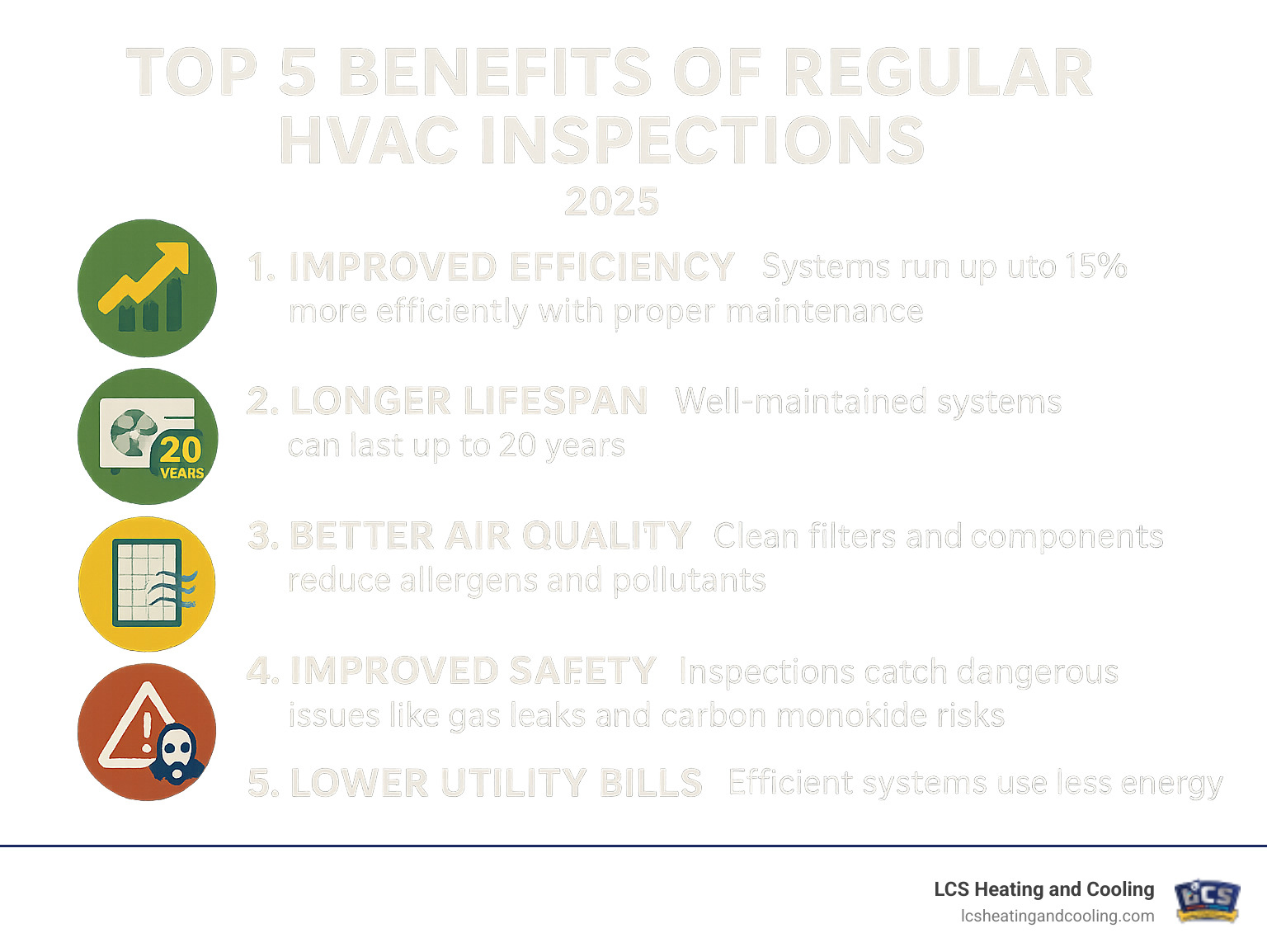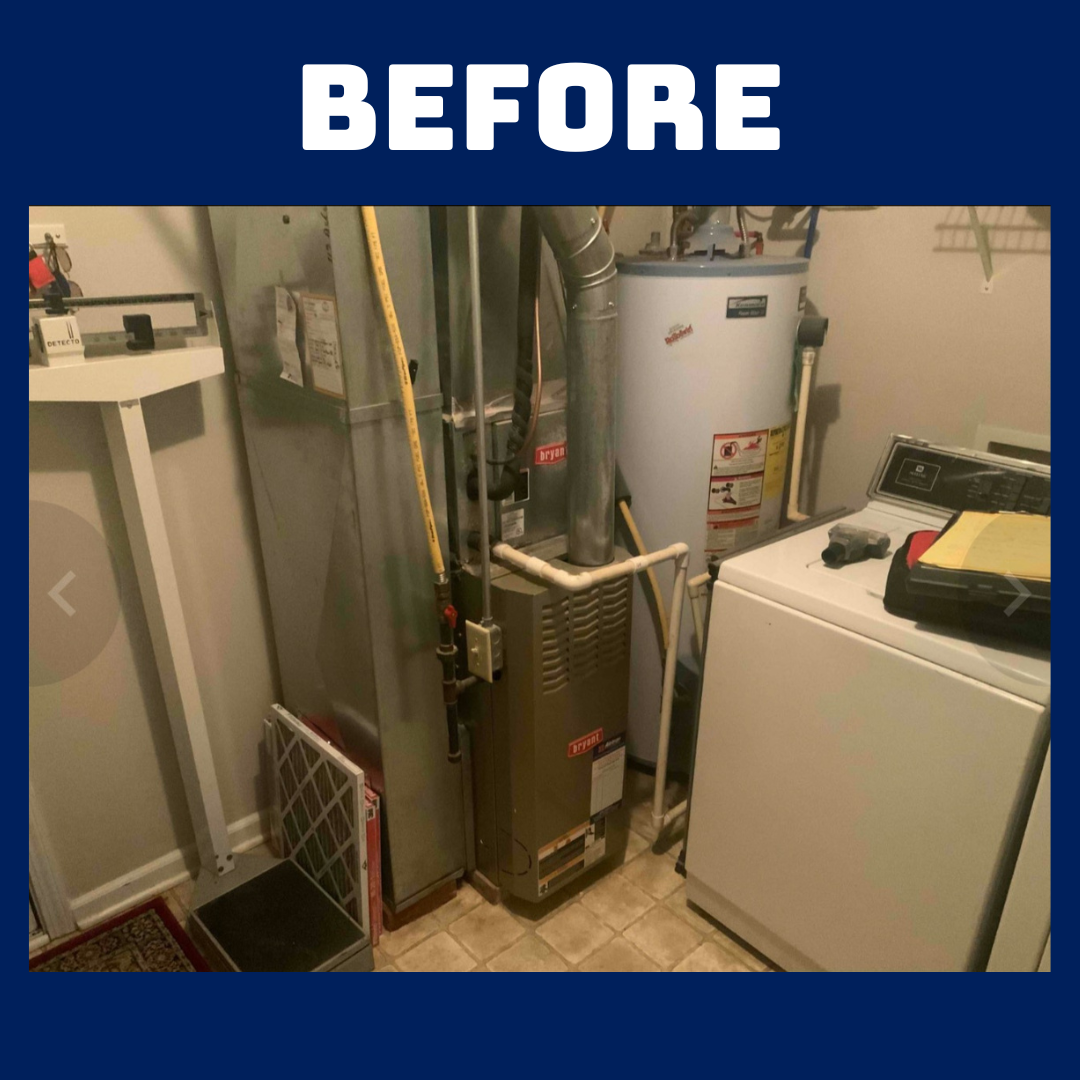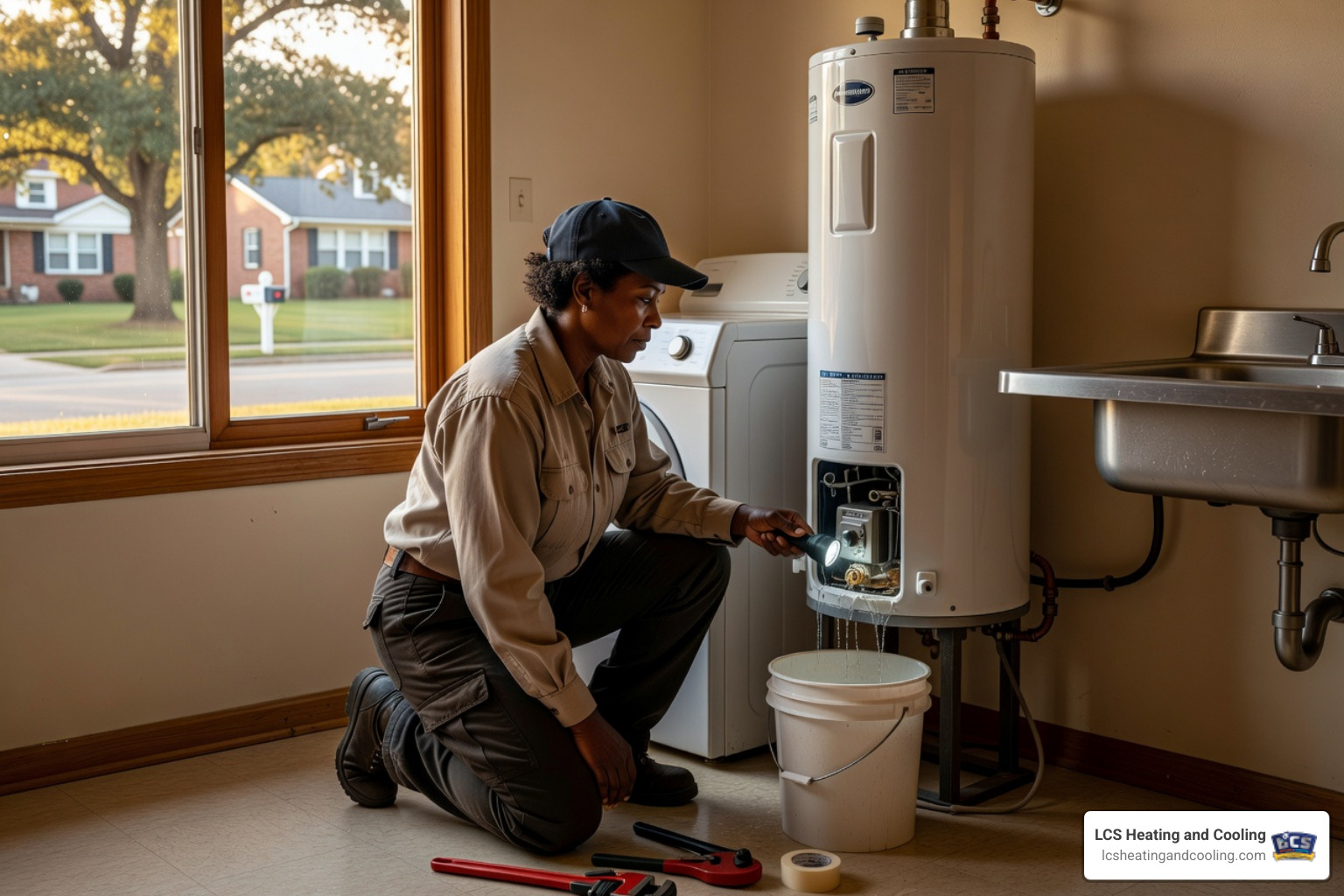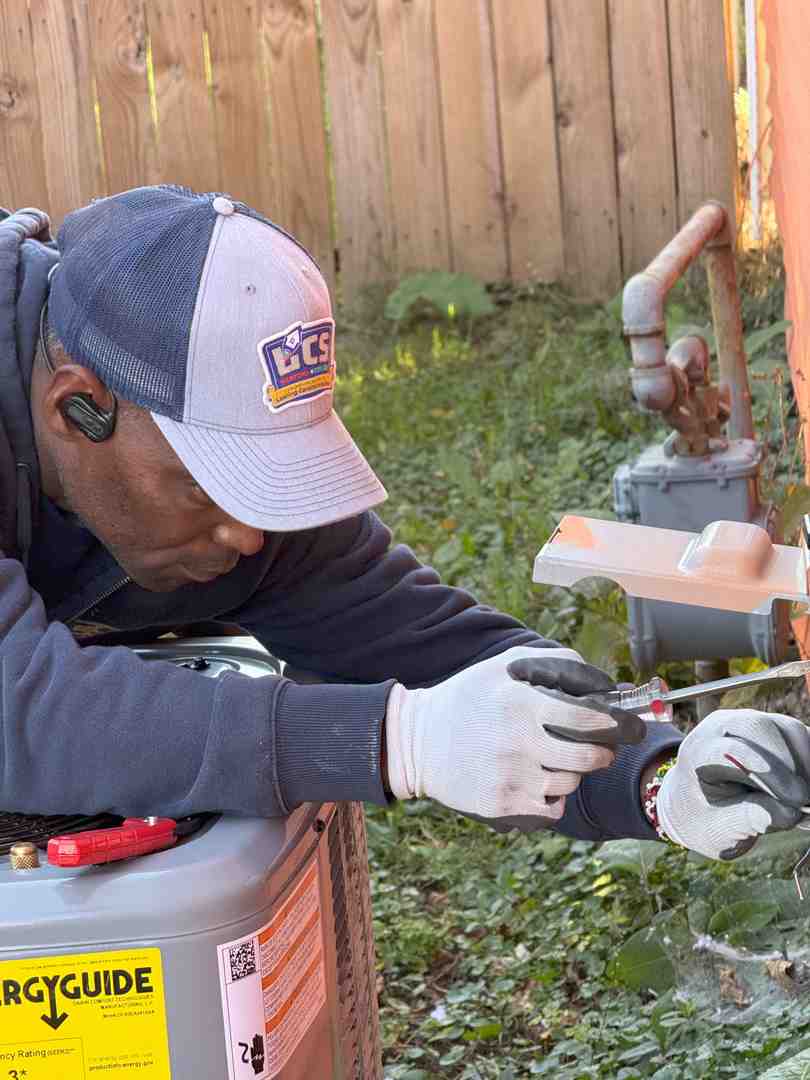Don't Sweat It: Demystifying Your HVAC Inspection
Why Your HVAC System Deserves Professional Attention
An HVAC inspection service is a comprehensive evaluation of your heating, ventilation, and air conditioning system. Certified technicians assess its efficiency, safety, and performance to catch minor issues before they become major problems. Your HVAC system works hard year-round to keep your Indianapolis home comfortable, but without professional attention, it's vulnerable to breakdowns when you need it most.
Key Components of an HVAC Inspection:
- Thermostat calibration and system controls check
- Electrical connections and safety component testing
- Heat exchanger inspection for cracks or damage
- Refrigerant levels and coil cleanliness assessment
- Ductwork examination for leaks and proper airflow
- Air filter condition and replacement recommendations
When to Schedule: At least once annually, ideally before peak heating and cooling seasons. Systems over 10 years old may need more frequent checks.
Typical Duration: 1-3 hours, depending on system complexity.
A proper HVAC inspection can improve your system's efficiency by up to 15% and help it last up to 20 years with regular maintenance. This means significant savings on both energy bills and future replacement costs.

Why Regular HVAC Inspections are Non-Negotiable
Just as your car needs regular oil changes to run smoothly, your HVAC system requires professional attention. It's one of the most expensive and hardworking appliances in your Indianapolis home, yet it's often neglected. Without routine care, small problems can escalate into surprise breakdowns on the hottest or coldest days of the year.
A regular HVAC inspection service can boost your system's efficiency by up to 15% and help it last up to 20 years. That means real savings and reliable comfort. For additional maintenance tips, check out this helpful EnergyStar guide.
Boost Energy Efficiency and Lower Your Bills
Over time, your HVAC system accumulates dirt and debris. Dirty coils force your equipment to work harder to maintain comfortable temperatures. This inefficient operation strains your system and leads to unexpected utility bill spikes.
When dust builds up on evaporator and condenser coils, your system can't transfer heat effectively. It runs longer cycles and uses more energy, yet may still fail to keep you comfortable. Proper maintenance through regular inspections addresses these issues. Clean coils, fresh filters, and calibrated thermostats work together to deliver reduced energy consumption, often saving you more than the cost of the service itself.
Ensure Safety and Improve Indoor Air Quality
Your HVAC system is crucial for your home's safety and air quality, making inspections a non-negotiable safety measure. A cracked heat exchanger in a gas furnace can allow deadly, odorless carbon monoxide to seep into your home.
Professional inspections include checks for gas leaks, carbon monoxide levels, and electrical hazards like loose connections. These are potentially life-threatening issues that only trained technicians can safely identify. For more on carbon monoxide safety, visit the CDC's comprehensive guide.
Your indoor air quality also depends on a clean system. Dirty filters fail to trap allergens and pollutants, circulating contaminated air. This is especially concerning for family members with asthma or allergies. A thorough HVAC inspection service ensures your system circulates clean, healthy air for a better living environment.
Extend the Lifespan of Your Equipment
Your HVAC system is a major investment that deserves preventative care. Without it, minor wear and tear accelerates into major component failure. A loose belt or a dirty coil can lead to expensive repairs or even a complete system replacement years ahead of schedule.
Regular inspections catch these issues early, when they are small and affordable to fix. Avoiding costly repairs is about preventing emergency breakdowns and the stress they cause. By maximizing your investment with consistent care, you ensure years of reliable comfort and avoid the expense of unexpected system failures.
Telltale Signs Your System is Crying Out for an Inspection
Your HVAC system will often signal for help before a major breakdown. Recognizing these warning signs can save you from messy and expensive repairs.
Unusual noises: Grinding, squealing, banging, or whistling sounds are not normal. Grinding can mean worn motor bearings, while whistling often points to airflow or ductwork issues.
Inconsistent temperatures: If you have hot and cold spots throughout your home, your system is struggling. This could be due to a faulty thermostat, ductwork problems, or a failing blower motor.
Poor airflow: Weak or minimal air coming from your vents suggests blocked ductwork, a struggling blower, or dirty coils that are restricting airflow.
Frequent cycling: A system that turns on and off more often than usual is short cycling. This can indicate an oversized unit, a bad thermostat, or other mechanical problems.
Rising utility bills: An unexpected spike in your energy costs is a clear sign your HVAC is working overtime and has lost efficiency.
Humidity problems: If your home feels sticky even when the AC is on, your system isn't removing moisture from the air effectively.
Musty odors: Smells coming from your vents often indicate mold or mildew growth in the system or ductwork, which requires professional attention.
If you notice any of these signs, don't wait. A professional HVAC inspection service can diagnose the cause and restore your system to quiet, efficient operation.
The Ultimate HVAC Inspection Checklist: What's Under the Hood?
An HVAC inspection service is a comprehensive physical for your home's hardest-working system. Unlike a basic home inspection, our certified technicians use specialized tools to examine the intricate details that impact your safety, comfort, and budget. We systematically check every component to catch small problems before they become big headaches.

Heating System Components (Furnace/Heat Pump)
Your heating system has components that pose serious safety risks if not maintained. Our inspection prioritizes:
- Heat exchanger inspection: We check for cracks that could leak dangerous carbon monoxide into your home.
- Burner combustion and gas pressure: We ensure clean, efficient ignition for optimal heating and lower bills.
- Ignition system: We verify reliable start-up to prevent a no-heat emergency on a cold morning.
- Flue pipe check: We inspect for blockages or corrosion that could trap exhaust gases indoors.
- Blower motor and wheel: We check the components that circulate warm air to prevent uneven heating and high energy use.
Cooling System Components (Air Conditioner/Heat Pump)
To prepare your AC for a hot Indianapolis summer, our inspection covers:
- Evaporator and condenser coils: We ensure both indoor and outdoor coils are clean for effective heat transfer and lower energy costs.
- Refrigerant charge check: We verify the system has the precise amount of refrigerant needed to cool efficiently without damaging components.
- Drain pan and condensation line: We check for clogs that can cause water leaks, one of the most common AC repair issues.
- Outdoor unit condition: We ensure the unit is level, secure, and free from obstructions.
Airflow and Ductwork
Proper airflow is critical for comfort. Your ductwork is your system's circulatory system, and we inspect it carefully.
- Air filters: We check their condition, as a clogged filter can cause numerous problems, from poor air quality to higher bills.
- Ductwork leaks: We look for leaks that can waste 20-30% of your conditioned air, silently driving up costs.
- Static pressure test: This test tells us how hard your system is working to move air, identifying potential blockages or design issues.
- Registers and vents: We ensure they are open and unobstructed for proper air distribution.
For more on improving efficiency, EnergyStar provides excellent guidance on duct sealing.
DIY Checks vs. Professional HVAC Inspection Service
While some HVAC maintenance tasks are perfect for homeowners, others require the expertise, tools, and safety training of a certified technician. Knowing the difference is key to keeping your system running smoothly and safely.
| What You Can Handle | What Needs a Professional |
|---|---|
| Changing air filters regularly | Checking refrigerant levels and electrical components |
| Clearing debris around outdoor unit | Testing safety controls and gas pressure |
| Basic visual inspections | Internal cleaning and mechanical diagnostics |
| Listening for unusual sounds | Comprehensive system performance analysis |
What You Can Do Between Professional Visits
Your role in maintaining your system is important. Between professional visits, you should:
- Change air filters: Do this every 1-3 months (more often with pets) to improve air quality and efficiency.
- Clear your outdoor unit: Keep the condenser free of leaves, grass, and debris to ensure proper heat release.
- Gently hose down coils: If the outdoor unit's coils look dirty, you can gently rinse them (with the power off).
- Perform a visual inspection: Look for obvious leaks, rust, or damage.
- Listen for odd noises: You know your system's normal sounds. If you hear something new, it's an early warning sign.
Why You Need a Certified Technician for a Full HVAC Inspection Service
Your DIY efforts are valuable, but they can't replace a professional HVAC inspection service. Here's why:
- Specialized tools and expertise: We use diagnostic equipment to measure refrigerant levels, electrical performance, and internal component health. Interpreting this data correctly requires years of training.
- Safety risks: HVAC systems involve high-voltage electricity, pressurized refrigerants, and combustible gases. Our licensed technicians are trained to handle these hazards safely.
- Warranty requirements: Many manufacturers require documented professional maintenance to keep your warranty valid. Skipping inspections could leave you paying for repairs that should be covered.
- Comprehensive diagnostics: Our NATE-certified technicians can spot subtle performance issues that lead to wear and tear, catching problems before they cause a system failure. You'll receive a detailed report explaining our findings and recommendations.
Timing, Cost, and What to Expect
Planning your HVAC inspection service is straightforward. It's about smart timing, understanding the investment, and knowing what to expect during the visit.
When, How Long, and How Much?
The best time to schedule is seasonally. A spring inspection prepares your AC for summer, while a fall checkup ensures your furnace is ready for winter. Bi-annual inspections are ideal, but one annual visit is far better than none. Systems over 10 years old benefit from more frequent checks.
An inspection typically takes 1-3 hours, though it may take longer if we find issues requiring a deeper look. We prioritize being thorough over being fast.
Regarding cost, view an inspection as an investment in efficiency and longevity. The service often pays for itself through lower energy bills and by avoiding costly emergency repairs. We provide transparent pricing with no hidden fees.
What to Look for in a Qualified Inspector
Choosing the right technician is crucial. Look for these qualifications:
- NATE-certification: This proves the technician has passed rigorous industry testing.
- Proper licensing and insurance: This protects you and ensures compliance with local requirements in Indianapolis, Carmel, and surrounding areas.
- Positive reviews: Honest customer feedback reveals a company's commitment to quality service and communication.
- Experience with your system: Ensure the technician is familiar with your specific equipment type.
- Clear communication: A great inspector explains findings in plain English and provides recommendations without pressure, which is the foundation of our 7-Star Concierge Service.
How a Residential HVAC Inspection Service Differs from Commercial
While we focus on residential service, it's helpful to know the difference. Commercial systems are larger and more complex, often involving rooftop units, chillers, and extensive ductwork. They are also subject to stricter ventilation standards and regulatory compliance for serving the public. Our residential inspections are personally custom to your family's home, comfort needs, and specific system.
Frequently Asked Questions about HVAC Inspections
Here are answers to the most common questions we receive about our HVAC inspection service.
How often should I schedule an HVAC inspection?
At a minimum, schedule an inspection once a year. However, bi-annually is ideal. A spring tune-up for your cooling system and a fall check-up for your heating system ensures year-round reliability. If your system is over 10 years old, it may benefit from more frequent inspections to stay in top condition.
Is an inspection necessary for a brand-new HVAC system?
Yes, absolutely. An initial inspection is critical to ensure proper installation and verify that the system is operating to manufacturer specifications. More importantly, many manufacturers require documented professional maintenance to keep your warranty valid. This first visit also establishes a performance baseline, helping us track your system's health over time.
What happens if the inspector finds a major problem?
Finding a problem is the primary reason for an inspection—it allows us to address issues before they cause a breakdown. If we find something, we provide a detailed report with a clear explanation of the findings. We will walk you through actionable recommendations and provide transparent repair or replacement estimates. This is a no-pressure consultation; we provide the information you need to make the best decision for your home and budget.
Your Partner for Year-Round Comfort
Your HVAC system works daily to keep your family comfortable through Indianapolis's changing seasons. A regular HVAC inspection service is your best strategy against high energy bills, poor air quality, and unexpected breakdowns.
At LCS Heating and Cooling, we make home comfort simple and stress-free for families across Indianapolis, Carmel, Fishers, Lawrence, Noblesville, and Zionsville. Our "7-Star Concierge Service" guarantees we show up on time, explain everything clearly, and provide recommendations without pressure.
Investing in proactive maintenance with us means you're choosing long-term value over short-term fixes. You're making informed decisions to prevent problems rather than just reacting to them.
Don't wait for a system failure. Be the homeowner who stays ahead of the game. Ready to give your HVAC system the professional attention it deserves? Schedule your HVAC inspection in Indianapolis with us today. Your family will thank you for it.




